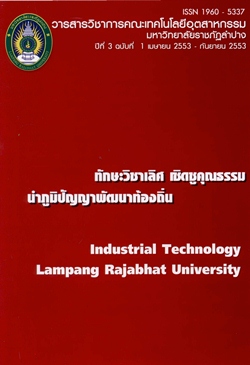การผลิตแผ่นใยไม้อัดแข็งจากวัสดุเหลือใช้ทางการเกษตรด้ยกระบวนการระเบิดด้วยไอน้ำ
Keywords:
แผ่นใยไม้อัดแข็ง, วัสดุเหลือใช้ทางการเกษตร, การระเบิดด้วยไอน้ำ, Hardboard, Agricultural residues, Steam explosionAbstract
-
Hardboard Production from Agricultural Residues by Steam Explosion Process
The purpose of this study was to examine the properties and environmental impacts of hardboard made from agricultural residues and manufactured by a steam explosion process. This study was divided into two parts. The first part involved the selection of the most effective agricultural material to develop fiberboard using the AHP technique. It was found that rice straw was the most suitable agricultural residue to be used as a raw material for producing hardboard. The second part of the study was the production arid the testing of the hardboard. In this study, rice straw was chosen as a raw material and was produced by a steam explosion process at a pressure level of 2.0 MPa and 2.4 MPa. The results showed that the hardboard pressured at 2.4 MPa yielded the best property, having a modulus of rupture at 32.733 MPa, a modulus of elasticity at 13,097.83 MPa, water absorption at 37.37% and swelling in water at 26.02%. In terms of environmental impacts using LeA assessment, it was found that the total environmental affect value was 2.5726E-03 Pt. When comparing the hardboard with fiber wood on the LeA food database, it was found that the hardboard has a slightly higher environmental affect value than fiber wood. The production analysis found that the compressed heating process of hardboard has the highest environment affect value at 54.02% and that soil toxicity has the most environmental affect at 46.56%.






